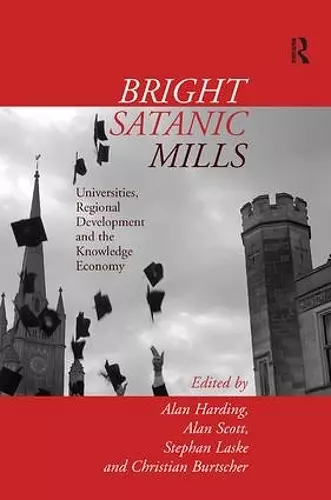Bright Satanic Mills
Universities, Regional Development and the Knowledge Economy
Alan Harding author Stephan Laske author Alan Scott editor
Format:Hardback
Publisher:Taylor & Francis Ltd
Published:19th Feb '07
Currently unavailable, and unfortunately no date known when it will be back
This hardback is available in another edition too:
- Paperback£44.99(9780367603809)

Recent years have seen a growing emphasis upon the need for universities to contribute to the economic, social and environmental well-being of the regions in which they are situated, and for closer links between the university and the region. This book brings together a cross-disciplinary and cross-national team of experts to consider the reasons for, and the implications of, the new relationship between universities and territorial development. Examining the complex interactions between the 'inner life' of the university and its external environment, it poses the question: 'Can the modern university manage the governance and balancing of these, sometimes conflicting, demands'? Against a backdrop of ongoing processes of globalization, there is growing recognition of the importance of sub-national development strategies - processes of regionalization, governmental decentralization and sub-national mobilization, that provide a context for universities to become powerful partners in the process of managing sub-national economic, social and environmental change. Allied to this, the continued evolution of the knowledge economy has freed up location decisions within knowledge-intensive industries, while paradoxically innovation in the production of goods and services has become still more 'tied' to locations that can nurture the human and intellectual capital upon which those industries rely. Thus cities and regions in which higher education services are concentrated have, or are thought to have, a competitive advantage. With universities facing ever increasing pressures of commercialization, which deepen the engagement between universities and external stakeholders, including those based in their localities, the tension between the university's academic (basic research and teaching) mission and external demands has never been greater. This book provides a long overdue analysis, bringing all the competing issues together, synthesizing the key conceptual debates and analyzing the way in which they have been experienced in different local, regional and national contexts and with what effects.
’This important collection provides a compelling historically and theoretically informed analysis of contemporary changes in universities and higher education sectors in OECD countries. The collection offers valuable new insights into the regional embeddedness of universities and how these relationships might evolve in the new era of borderless growth.’ Mark Considine, University of Melbourne, Australia ’Universities are under pressure. This provocative and stimulating book analyses the key dynamics of those bright satanic mills in charge of knowledge production. The book is highly original and contains striking material to help us think about contemporary changes in the role and scale of universities.’ Patrick Le Galès, Sciences Po Paris/CNRS/CEVIPOF, France ’Harding, Scott, Laske and Burtscher have assembled a critical resource and insightful discussion into the organizational and human complexity impacting the successful formation and maintenance of relevant and effective university/economic development partnerships.’ Information Technology and People 'Bright Satanic Mills, Universities, Regional Development and the Knowledge is a fresh contribution to the debate on universities and regional development. It appears that university regional engagement is easier to talk about than to do. Bright Satanic Mills goes a long way to explaining why that is, and suggesting what needs to change if universities are to forge a path beyond corporatism into the wilds of the knowledge economy.' Education, Citizenship and Social Justice 'The book itself is well-presented and fully references edited text produced by some eighteen contributors...It provides a very good introduction to the debates as to the degree to which higher education institutions are "spatially rooted engines of economic, social and environmental change"' Environment and Planning B: Planning and Design
ISBN: 9780754645856
Dimensions: unknown
Weight: 453g
258 pages